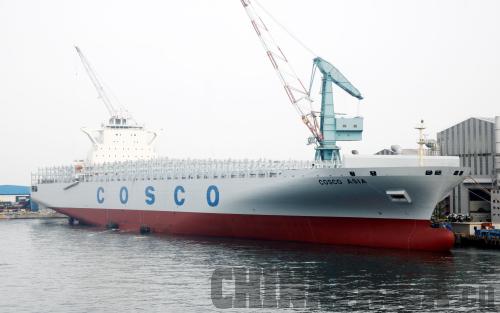|
 |
|
Hard times have hit China's shipping giant COSCO as it restructures for the future |
China COSCO Holdings Co., the world's second largest shipping company by fleet size, continued to suffer heavy losses in 2012. Since its listing on the mainland's A-share market in 2007, its share price experienced a sharp plunge from 70 yuan ($11.26) to less than 5 yuan ($0.80), putting investors on edge.
In the first three quarters of 2012, COSCO saw losses totaling 6.4 billion yuan ($1.03 billion).
The COSCO Group, COSCO's parent company, is trying to ensure its long-term viability by selling assets.
In December 2012, the COSCO Group announced a plan to sell 29.7 percent of its stock in Shanghai Eastern Logistics Co. Ltd., whose net assets are 815 million yuan ($131.13 million) in book value and 1.89 billion yuan ($304.1 million) in estimated value, at a premium rate of over 132 percent.
On January 8, the first stockholders' meeting in 2013 marked the acquisition of Guangzhou Ocean Shipping Co. Ltd., an unlisted company in the group, by COSCO Shipping Co. Ltd., another listed company of the COSCO Group.
Ye Weilong, Chairman of COSCO Shipping, said that the decision will expand the company's business scope and fleet size at low cost.
As the COSCO Group has yet to be fully listed, COSCO Holdings may attempt to get rid of money-draining assets and inject good assets from the COSCO Group in an effort to restructure and avoid delisting.
Hard times
Due to the global financial crisis, demand for raw materials has been sluggish, pushing down the Baltic Dry Index (BDI), a barometer of shipping costs for dry bulk commodities. In the first half of 2012, the BDI averaged 943 points, down 31.3 percent from the same period in 2011.
It has been widely recognized that the break-even range for COSCO is 1,500 to 2,000 points. But in 2011 when the BDI averaged 1,549 points, COSCO still lost 10.4 billion yuan ($1.67 billion).
A number of international iron ore giants have begun to establish their own fleets in order to save on transportation costs. For instance, Companhia Vale do Rio Doce, the world's largest iron ore supplier, has built up its own fleet to support its iron ore trade with China. The fleet is composed of ore carriers and has a total transport capacity of 400,000 tons. In contrast, COSCO's main fleet vessel, the Capesize bulk carrier, can only carry 80,000 tons.
On December 24, 2012, the BDI dropped to 699, indicating that the shipping industry would not be saved by a quick recovery.
According to the Shanghai International Shipping Institute's latest report, the dry bulk and container shipping market will stay bleak in 2013 as capacity continues to outstrip volume.
Overcapacity
The global shipping industry enjoyed five good years starting in 2003, when companies placed a large number of orders at shipyards across the world.
Making a big bet on China's robust economic growth, COSCO expanded its fleet of dry bulk carriers from 400 in 2007 to 450 in 2010. By June 30, 2012, COSCO operated 357 dry bulk carriers, 227 of which were self-owned while 130 were rented, with total transport capacities of 18.93 million tons and 13.49 million tons respectively. Additionally, it also placed orders for 18 new dry bulk carriers with a transport capacity of 1.67 million tons. This blind expansion ultimately landed COSCO in severe difficulties.
Wei Jiafu, Chairman of COSCO and President of the China Ship-owners Association, attended the Boao Forum for Asia in April 2012 where he appealed for carriers worldwide to strengthen their cooperation and self-discipline, and restrain from building more new ships.
Excess capacity has also led to plummeting shipping fees. "In 2008, the shipping rate for imported coal was 150 yuan ($22) per ton. Now it's down to just over 20 yuan ($3) per ton, which means carriers are seeing big losses," said Luo Ning, Deputy Director of the Port and Shipping Administration Bureau of Zhoushan in Zhejiang Province.
Faced with persistent losses, carriers raised their rates in a coordinated move in August 2012, but the excess capacity and resulting price war forced container shipping rates back down, dropping by over $100 a week.
However, many doubt that increasing rates will bring about greater profitability.
Diversification
Still, despite a hard winter affecting the whole industry, some shipping enterprises are reporting profits. AP Moller-Maersk Group, the largest container ship and supply vessel operator in the world, saw profits of $3.4 billion in 2011, despite a loss of $600 million in container transport. The firm's branch company Maersk Oil and Gas brought in $2.1 billion. In the first half of 2012, the group also made $2.1 billion, though suffering a loss of $400 million in its shipping business.
As Liu Bin, a professor from Dalian Maritime University, notes, Maersk had long maintained its presence in some sectors that are not closely connected to the shipping industry, like retail, oil and gas, buffering the negative impact of the current downturn.
However, COSCO's concentration on its main business dragged it into a negative cycle. As its main businesses - container and dry bulk shipping and port operations - are interwoven with each other, when the shipping industry hit hard times, there was no shelter for the company. COSCO should make some adjustments to its current business structure to lower risks.
COSCO has taken some action to reverse its current plight, said Wei at the 2012 World Shipping (China) Summit held in Xiamen, Fujian Province, in September 2012.
"In fact, Maersk is also losing big money in its shipping business. But with its treasure bowl - offshore oil business, it managed to ride out of the storm," said Wei. "Now, we are trying to explore other means to build profit and cover losses." |